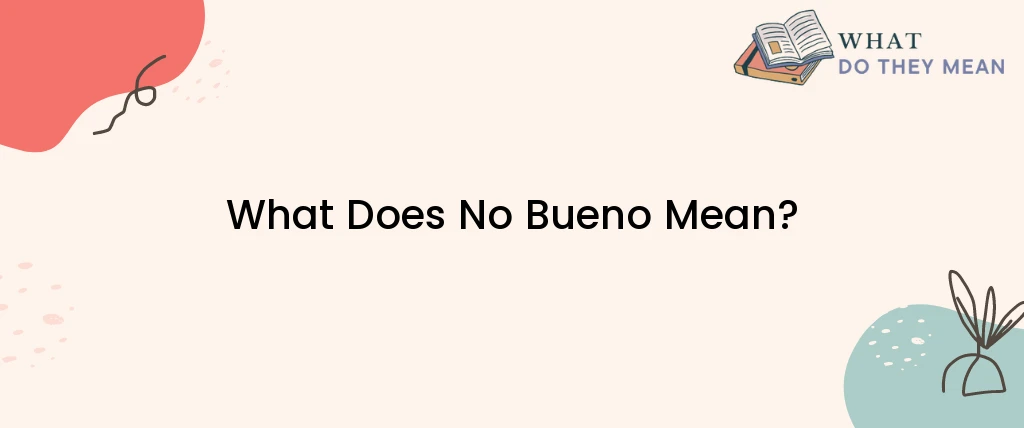“No Bueno” is a Spanish phrase that can be translated as “not good” or “no good” in English. It’s often used informally to indicate that something is undesirable, unfavorable, or not satisfactory. For example, if someone asks you how your day was and you had a bad day, you might respond by saying “no bueno” to express that it wasn’t a good day.
Etymology and Usage
The phrase “no bueno” comes from the Spanish language, where it translates to “not good” or “no good” in English. It is a common expression used in everyday conversation in Spanish-speaking countries to describe something that is not satisfactory or desirable. In recent years, the phrase has become increasingly popular in English-speaking countries, especially among young people.
In English, “no bueno” is often used to indicate that something is not going well, or that something is not of good quality. It can also be used to express disappointment or disapproval. For example, if someone tells you they’re going to eat at a restaurant that has a bad reputation, you might say “no bueno” to indicate that it’s not a good idea.
Common Usage
“No bueno” is a versatile expression that can be used in a variety of situations. Here are some examples of common ways the phrase is used:
- Food: If you try a new dish and find it unappetizing, you might say “no bueno” to indicate that it’s not good.
- Travel: If you have a bad experience while traveling, you might use “no bueno” to describe the situation.
- Relationships: If you’re having problems in your relationship, you might use “no bueno” to express your dissatisfaction.
- Work: If you’re struggling with a project or your job in general, you might use “no bueno” to describe the situation.
Pop Culture
“No bueno” has become a popular phrase in pop culture, especially in television shows and movies. It’s often used to add humor or emphasis to a situation. For example, in the TV show Breaking Bad, the character Jesse Pinkman frequently uses “no bueno” to describe his dissatisfaction with various situations.
In the movie Nacho Libre, the main character frequently uses “no bueno” to describe situations that are not going well. The phrase has also been used in various songs, including “The Real Slim Shady” by Eminem and “Goodbye Earl” by the Dixie Chicks.
Cultural Appropriation
Some people have criticized the use of “no bueno” by English speakers, arguing that it is a form of cultural appropriation. They argue that the phrase is part of the Spanish language and culture and should not be co-opted by non-Spanish speakers.
Others argue that language is constantly evolving and that the use of “no bueno” by English speakers is simply a reflection of the way language changes over time. They point out that many words and phrases from other languages have been incorporated into English over the years, and that “no bueno” is no different.
Conclusion
In conclusion, “no bueno” is a Spanish phrase that has become a popular expression in English-speaking countries. It is used to describe something that is not satisfactory or desirable and is often used in everyday conversation. While some people have criticized the use of “no bueno” by English speakers, others see it as a natural evolution of language. Regardless of one’s opinion on the use of the phrase, it is clear that “no bueno” has become a part of popular culture and is likely to continue to be used for years to come.

As a researcher, I am curious and driven by the pursuit of knowledge. I approach my work with a critical eye, carefully evaluating sources and methods to ensure that my findings are accurate and reliable. Whether delving into scientific studies, historical records, or cutting-edge technologies, I am always seeking to expand my understanding and make new discoveries. I am dedicated to uncovering new insights and finding solutions to complex problems, and am driven by a passion for uncovering the truth.

